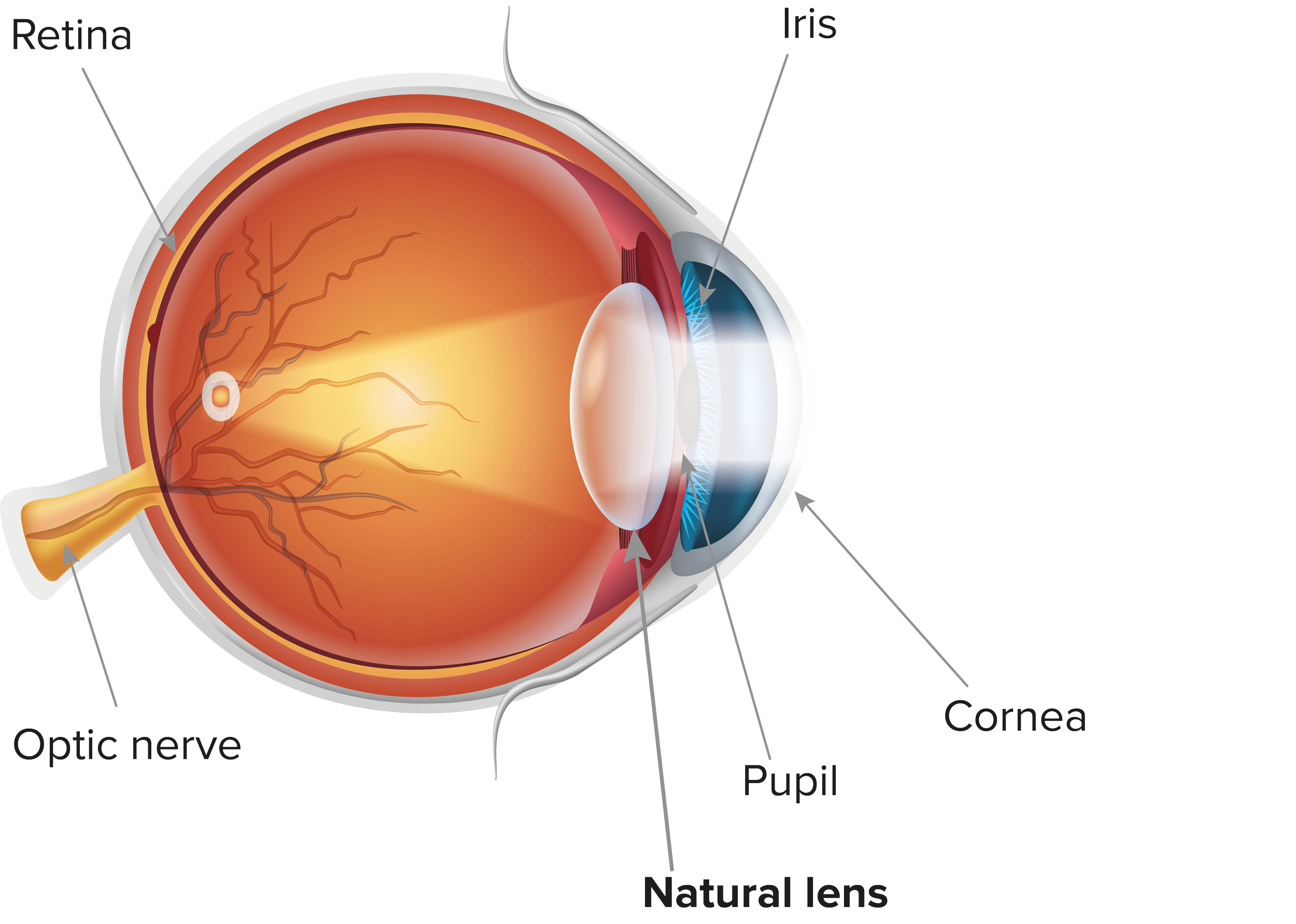Lens replacement surgery is performed to improve your functional vision, eliminating or reducing your dependence upon glasses or contact lenses. It is an opportunity to permanently correct your short sightedness (myopia) or long sightedness (hyperopia) and / or astigmatism.
How is lens replacement surgery performed?
To see clearly the light processing retina needs to receive a sharp focus of light. The retina then converts this into an electrical impulse your brain can understand.
Your eye has two inbuilt lenses that collect light and together should bend it to create a clear image. These are the cornea, that covers your iris (coloured part of the eye) and the pupil. The second is the natural lens inside your eye.
An imbalance in the combined power of these lenses causes the light rays to either fall short of the retina (myopia or short-sightedness), or focus behind the retina (hyperopia or long-sightedness). Both cause blurred vision.
Glasses or contact lenses can be used to correct the power imbalance of the eye. Lens replacement surgery also achieves this with the aim of reducing or removing the need for glasses or contact lenses.
Myopia (short-sighted)
Light rays fall short of the retina due to the eye being too powerful.
Hyperopia (long-sighted)
Light rays fall behind the retina due to the eye being underpowered.
Astigmatism
Astigmatism - Two points of focus are created. These can fall in front of or behind the retina or a combination of the two.
Lens replacement surgery is identical to Cataract surgery and one of the most common surgical procedures in the world. The procedure involves removing the contents of your natural lens and then inserting a new, usually acrylic lens into the casing that is deliberately left behind.
This new lens has been carefully selected to balance the power of your eye.

Who is suitable for lens replacement surgery?
Greater independence
If you are fed up with contact lenses or glasses then lens replacement surgery may be a great option, providing the freedom of having your vision 24h per day. If your lifestyle makes wearing contact lenses or glasses challenging, then lens replacement may be a great permanent solution.
Permanent solution
The intraocular lenses used in lens replacement surgery are typically made of plastic acrylic and therefore last a lifetime. The natural lens is responsible for the gradual change in glasses prescription with age. This is replaced during the surgery meaning your prescription should remain stable.
Age
Typically lens replacement surgery becomes an option over the age of 50. There are particular reasons why this may be considered younger or delayed until an older age. Safety is our primary concern; we will always give you an honest opinion and advice on the best way forward, even if it is to do nothing. The great news is we have lots of methods to achieve the same goal.
Benefits all prescriptions
Lens replacement surgery can treat a full range of glasses prescriptions, often even the most complex. If you are very shortsighted, longsighted or have high astigmatism this can be corrected. Contact us for more details.
Preventative
Lens replacement surgery prevents you from developing a cataract in later life.
Presbyopia
Lens replacement surgery can provide a full range of focus helping you to regain your reading vision without contact lenses or glasses.
How quickly can I return to sport and normal activities?
You can return to normal activities very quickly following lens replacement surgery. We advise avoiding swimming for a month and any contact sports for three months. You can restart normal sporting activities such as running, going to the gym, cycling etc after a your first post-operative appointment, which , is usually on day 5-7. Depending upon your job you are likely to be able to return sooner than this. We will provide more personalised information before your surgery.
How much does lens replacement surgery cost?
We are entirely transparent about pricing. We have three categories for lens replacement surgery; enhanced, premium and complex. The type of lens is the main differentiator between enhanced and premium. Our complex category refers to patients who may have had previous laser eye surgery with another provider or have a complex prescription. The fees include the hospital admission, surgeon fee, the surgical procedure, your post-operative drops, two follow-ups, the medications given on the day of surgery and the cost of any laser enhancement that may occasionally be required after the procedure.
What is the usual follow-up after lens replacement surgery?
Following the surgery you will need to attend for follow-ups, typically day 5-7 and week 6. Even though you my become spectacle independent it is still important to have annual follow-ups with your local Optometrist to check the health of your eyes.
What is laser enhancement?
We perform extensive investigations and calculations during your initial assessment, which typically takes around 90 minutes. Mr Darcy performs all types of refractive surgery, meaning he will perform any enhancements in-house himself. There are no hidden fees - the cost of a laser enhancement is included in the price for lens replacement surgery.
A laser enhancement my be required if the actual result is slightly off the intended calculated target. Even with our diligence and advanced technology, around 1 in 20 patients may end up with a 'refractive surprise'. In this instance, you may require a laser enhancement to correct this. We usually wait three months after the procedure until your eyes have settled before performing this. A laser enhancement uses laser eye surgery to fine tune the final result. We will assess your suitability for this before performing the lens replacement. There are certain instances where people may not be suitable for an enhancement. If you are in this small group, during this first three-month period, you may need some glasses to sharpen your vision.
Can lens replacement surgery treat presbyopia?
Absolutely, this is one of its key benefits!









